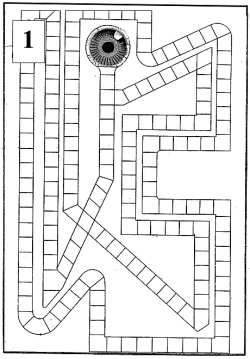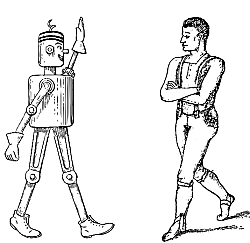 Personhood Week, at National Geographic is a nice set of short pieces briefly touring the issues around the crucial but controversial issue of what constitutes a person.
Personhood Week, at National Geographic is a nice set of short pieces briefly touring the issues around the crucial but controversial issue of what constitutes a person.
You won’t be too surprised to hear that in my view personhood is really all about consciousness. The core concept for me is that a person is a source of intentions – intentions in the ordinary everyday sense rather than in the fancy philosophical sense of intentionality (though that too). A person is an actual or potential agent, an entity that seeks to bring about deliberate outcomes. There seems to be a bit of a spectrum here; at the lower level it looks as if some animals have thoughtful and intentional behaviour of the kind that would qualify them for a kind of entry-level personhood. At its most explicit, personhood implies the ability to articulate complicated contracts and undertake sophisticated responsibilities: this is near enough the legal conception. The law, of course, extends the idea of a person beyond mere human beings, allowing a form of personhood to corporate entities, which are able to make binding agreements, own property, and even suffer criminal liability. Legal persons of this kind are obviously not ‘real’ ones in some sense, and I think the distinction corresponds with the philosophical distinction between original (or intrinsic, if we’re bold) and derived intentionality. The latter distinction comes into play mainly when dealing with meaning. Books and pictures are about things, they have meanings and therefore intentionality, but their meaningfulness is derived: it comes only from the intentions of the people who interpret them, whether their creators or their ‘audience’. My thoughts, by contrast, really just mean things, all on their own and however anyone interprets them: their intentionality is original or intrinsic.
So, at least, most people would say (though others would energetically contest that description). In a similar way my personhood is real or intrinsic: I just am a person; whereas the First Central Bank of Ruritania has legal personhood only because we have all agreed to treat it that way. Nevertheless, the personhood of the Ruritanian Bank is real (hypothetically, anyway; I know Ruritania does not exist – work with me on this), unlike that of, say, the car Basil Fawlty thrashed with a stick, which is merely imaginary and not legally enforceable.
Some, I said, would contest that picture: they might argue that ;a source of intentions makes no sense because ‘people’ are not really sources of anything; that we are all part of the universal causal matrix and nothing comes of nothing. Really, they would say, our own intentions are just the same as those of Banca Prima Centrale Ruritaniae; it’s just that ours are more complex and reflexive – but the fact that we’re deeming ourselves to be people doesn’t make it any the less a matter of deeming. I don’t think that’s quite right – just because intentions don’t feature in physics doesn’t mean they aren’t rational and definable entities – but in any case it surely isn’t a hit against my definition of personhood; it just means there aren’t really any people.
Wait a minute, though. Suppose Mr X suffers a terrible brain injury which leaves him incapable of forming any intentions (whether this is actually possible is an interesting question: there are some examples of people with problems that seem like this; but let’s just help ourselves to the hypothesis for the time being). He is otherwise fine: he does what he’s told and if supervised can lead a relatively normal-seeming life. He retains all his memories, he can feel normal sensations, he can report what he’s experienced, he just never plans or wants anything. Would such a man no longer be a person?
I think we are reluctant to say so because we feel that, contrary to what I suggested above, agency isn’t really necessary, only conscious experience. We might have to say that Mr X loses his legal personhood in some senses; we might no longer hold him responsible or accept his signature as binding, rather in the way that we would do for a young child: but he would surely retain the right to be treated decently, and to kill or injure him would be the same crime as if committed against anyone else. Are we tempted to say that there are really two grades of personhood that happen to coincide in human beings, a kind of ‘Easy Problem’ agent personhood on the one hand and a ‘Hard Problem’ patient personhood? I’m tempted, but the consequences look severely unattractive. Two different criteria for personhood would imply that I’m a person in two different ways simultaneously, but if personhood is anything, it ought to be single, shouldn’t it? Intuitively and introspectively it seems that way. I’d feel a lot happier if I could convince myself that the two criteria cannot be separated, that Mr X is not really possible.
What about Robot X? Robot X has no intentions of his own and he also has no feelings. He can take in data, but his sensory system is pretty simple and we can be pretty sure that we haven’t accidentally created a qualia-experiencing machine. He has no desires of his own, not even a wish to serve, or avoid harming human beings, or anything like that. Left to himself he remains stationary indefinitely, but given instructions he does what he’s told: and if spoken to, he passes the Turing Test with flying colours. In fact, if we ask him to sit down and talk to us, he is more than capable of debating his own personhood, showing intelligence, insight, and understanding at approximately human levels. Is he a person? Would we hesitate over switching him off or sending him to the junk yard?
Perhaps I’m cheating. Robot X can talk to us intelligently, which implies that he can deal with meanings. If he can deal with meanings, he must have intentionality, and if he has that perhaps he must, contrary to what I said, be able to form intentions after all – so perhaps the conditions I stipulated aren’t possible after all? And then, how does he generate intentions, as a matter of fact? I don’t know, but on one theory intentionality is rooted in desires or biological drives. The experience of hunger is just primally about food, and from that kind of primitive aboutness all the fancier kinds are built up. Notice that it’s the experience of hunger, so arguably if you had no feelings you couldn’t get started on intentionality either! If all that is right, neither Robot X nor Mr X is really as feasible as they might seem: but it still seems a bit worrying to me.



